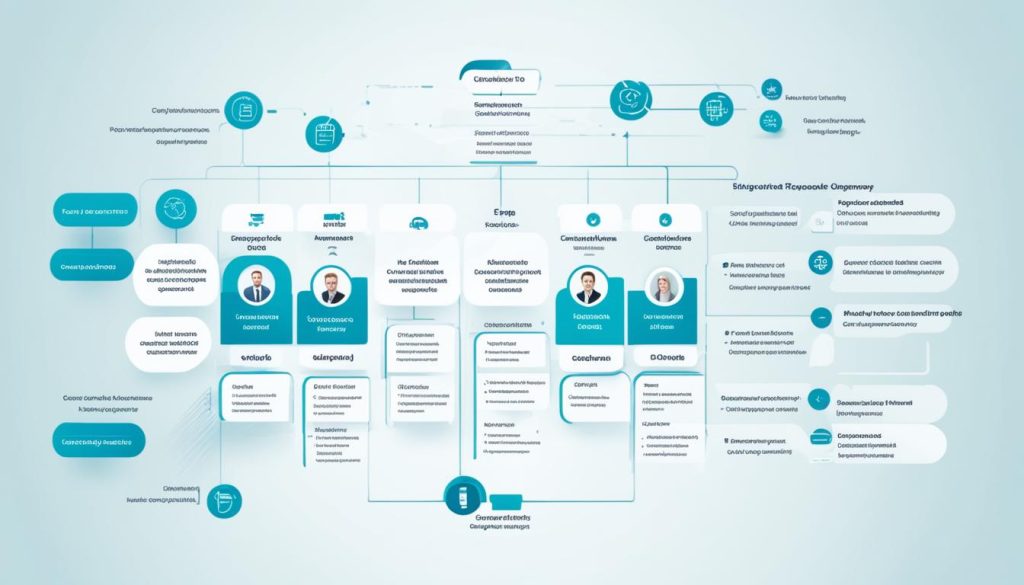“The best way to predict the future is to create it.” – Peter Drucker. This quote sums up the journey of starting an IT company in Italy. With a growing need for new tech solutions, now is a great time for entrepreneurs to start their IT business. Italy has a thriving economy that welcomes tech progress and new businesses. We’ll cover the key steps for a successful launch in Italy, including market trends, growth chances, and legal rules for IT companies.
Key Takeaways
- Understand the increasing demand for IT services in Italy.
- Identify the opportunities and trends within the Italy IT industry.
- Create a comprehensive business plan tailored to your objectives.
- Navigating legal obligations is vital for compliance and growth.
- Establish a strong brand identity to stand out in a competitive market.
Understanding the Italian Market for IT Businesses

The Italian IT market is unique for entrepreneurs looking to start their businesses. A deep dive into the market shows different demands and preferences across Italy. It’s key to know these to make services and products that meet local needs.
Nowadays, cloud computing, cybersecurity, and digital transformation are big in Italy. The market is growing fast, thanks to businesses and people adopting new tech. With more worries about data privacy, cybersecurity is more important than ever. This gives companies that focus on it a big advantage.
Government support for tech startups is a big help in the sector. Programs that boost investment in IT open up more chances for new companies to do well. Big names in the market, from well-known firms to new startups, show how lively the Italian IT scene is.
Doing a thorough market analysis in Italy is vital for entrepreneurs. It gives them the insights they need to place their IT company right. By knowing the trends and what customers want, businesses can plan and offer things that help them grow in the competitive Italian IT market.
Identifying Your Niche in the IT Industry

Finding a specific niche in the vast IT industry is key for new businesses. It helps them focus on areas like software development, IT consultancy, managed services, or cybersecurity solutions. Knowing the different parts of the IT world helps entrepreneurs stand out in a crowded market.
Choosing a niche means looking closely at what you’re good at and what you enjoy. Think about these points when picking your IT niche:
- Look at your skills and experiences to see where you shine.
- Do some market research to find out what’s missing.
- Check out competitors to see what they do well and where they fall short.
This careful planning makes sure the niche fits your skills and meets market needs. By focusing on a specific area of IT, businesses can create solutions that exactly match what customers want. This leads to better marketing and a strong reputation in the industry.
Creating a Comprehensive Business Plan

A strong business plan is key for IT companies wanting funding and better operations. It needs clear goals and a plan for growth. The mission statement sets the direction, and specific goals keep everyone focused. Setting measurable goals and deadlines helps track progress.
Defining Your Objectives
For a business plan, it’s important to set clear goals. These goals should cover different parts of the business, like:
- Financial targets and revenue projections
- Market entry strategies
- Product development timelines
- Customer acquisition goals
Having these goals gives a clear direction and lets you measure success.
Researching the Competition
Understanding the competition is crucial for a business plan. It helps see the market and spot chances and risks. Key steps are:
- Identifying key competitors and their offerings
- Assessing their strengths and weaknesses
- Analysing their market positioning and strategies
- Determining areas for differentiation and potential competitive advantages
This analysis helps make smart strategic choices, making sure the business stands out.
Choosing the Right Business Structure

Choosing the right business structure is key for a successful IT company in Italy. Entrepreneurs have many legal options, each with its own rules, tax duties, and how flexible it can be. These options include:
- Sole Proprietorship: This is simple and the owner has full control but is personally responsible for all debts.
- Partnership: Good for businesses with more than one owner, but all partners are on the hook for business debts.
- Limited Liability Company (SRL): This limits personal risk, making it a popular choice for many IT companies.
It’s important to think about how you’ll be liable when picking a structure. An SRL, for example, protects your personal stuff better than being a sole owner or partner. Taxes also matter a lot in this choice. Each structure has different tax rates and rules, which can change how much money you make and how you invest.
This choice impacts not just the law but also how appealing your business is to investors. Knowing these options helps entrepreneurs make smart choices that fit their goals in the competitive IT world.
Legal Requirements for Starting an IT Company in Italy

Starting an IT company in Italy means you must know the legal rules. This includes registering your business and understanding taxes for IT companies. Following these rules helps your business run smoothly.
Registering Your Business
To register your business, you need to go to the local Chamber of Commerce. You’ll need to prepare documents like:
- A formal application for registration
- Proof of identity and address of the business owner
- Details of the business activities to be conducted
- Compliance with local regulations and licenses applicable to IT operations
After registering, your company gets a unique number. This number is important for talking to financial and tax authorities.
Understanding Tax Obligations
Taxes for IT firms in Italy include income tax and VAT registration. New businesses need to know about:
- Corporate tax rates for IT firms
- Filing timelines for tax returns
- Requirements for VAT registration if sales go over certain limits
Not following tax rules can lead to fines and hurt your profits. So, it’s smart to talk to a local accountant or tax advisor to understand taxes for IT firms.
Funding Your IT Company in Italy

Finding the right funding in Italy is key for your IT business’s success. You have many options, like bank loans, government grants, and venture capital. Each has its own benefits to help your startup grow.
Bank loans are a popular choice for IT startups. Banks offer special products for tech businesses. You’ll need a strong business plan and something valuable as collateral.
Government grants are great for boosting innovation. They focus on IT sectors, helping entrepreneurs with new projects. It’s important to keep up with these funding opportunities.
Venture capital is another good way to finance your company. Investors give you money in exchange for a part of your business. To get venture capital, you need a solid financial plan and a strong pitch. Show off what makes your company stand out and your plans for growth.
In summary, knowing about the funding options in Italy can greatly help your IT company. Each funding type needs careful planning but can bring big rewards for your business.
Building a Strong Brand Identity

Creating a strong brand identity is key to success in the IT market. It means making your brand stand out and connect with your audience. A strong brand identity shows what your company values, mission, and vision. This is crucial for drawing in clients and keeping them.
Designing Your Logo and Website
Logo design is crucial for making a first impression on potential customers. A good logo is memorable, flexible, and looks great. It’s the visual representation of your brand, showing what your company is all about in one image.
Invest time in making a logo that truly represents your brand. This ensures it fits with your messaging and services.
Your website is like a digital shop window. Website development in Italy is key to your online presence. A good website is easy to use, looks good on any device, and has all the info people need.
- Consistent visual branding that matches your logo and overall look
- Clear and simple messaging that shares your unique value
- Easy to navigate to improve user experience and keep people interested
- Optimised for search engines to be more visible
There are many tools and platforms for entrepreneurs to create a great logo and website. Using these can make the process easier and help develop your brand identity. This supports your business goals.
Establishing a Digital Presence

In today’s digital world, having a strong online presence is crucial for IT businesses. A good digital marketing strategy is key to success. IT companies need to engage with customers in many ways to stand out.
Search engine optimisation (SEO) is vital for being seen online. By using SEO well, websites get higher rankings and more visitors. This helps turn visitors into customers.
Social media is also key for IT companies. On platforms like LinkedIn, Twitter, and Facebook, businesses can talk directly to their audience. Sharing news, updates, and helpful content can make the brand more known and get new leads.
Content marketing is also important for a strong online presence. Making quality, useful content builds trust and authority with customers. This content can be blogs, videos, or whitepapers, and should be shared on all the right places.
A strategy that combines SEO, social media, and content marketing will strengthen an IT company’s online presence. This approach will help grow the business and keep customers coming back.
Networking within Italy’s IT Community

Connecting with others in the IT community Italy is key for new IT companies. It helps in finding valuable partnerships and collaborations. These can greatly help a business grow. Being part of industry events lets professionals share ideas, learn about new trends, and show off their skills.
There are many ways to get involved:
- Going to conferences on the newest tech.
- Joining groups that meet up to talk about IT topics.
- Talking in online forums with other IT community Italy members.
Events in the industry are great for sharing your work and learning from others. They help in building strong professional relationships. These events also offer chances for mentorship, helping with skill growth and making you more known in the competitive IT world.
Hiring Skilled Professionals for Your IT Company

Attracting top talent is key for an IT firm’s success. It’s not just about offering good pay; it’s about having a strategy for job descriptions that speak to skilled professionals. Knowing how to write job descriptions in Italy can make your company stand out when hiring.
Creating Attractive Job Descriptions
Job descriptions should be clear about what the job involves. They should include:
- Job title: Use clear and relevant titles to capture attention.
- Responsibilities: Detail the day-to-day tasks and long-term goals.
- Requirements: Specify the qualifications, experience, and skills necessary.
- Company culture: Highlight what makes your organisation a great place to work.
Showing off your company’s unique values and benefits will make you more appealing when hiring IT experts.
Understanding Local Employment Laws
Following local employment laws is a must. It’s not just the law; it helps create a positive work environment. Important things to think about include:
- Working hours: Understand the standard hours and overtime rules.
- Contracts: Make sure all employees have clear contracts.
- Employee rights: Learn about local laws on workplace discrimination and benefits.
Following these employment laws builds trust and credibility with your team. This is crucial for a successful IT company.
Marketing Strategies for Your New IT Business

Creating effective marketing strategies is key for your IT business to grow. In the digital marketing scene of Italy, having a strong online presence is vital. It helps increase visibility and draw in potential clients. Using targeted social media campaigns is a great way to reach your audience.
Content creation is crucial for keeping people interested. Making quality articles, blogs, and videos that speak to your audience can show off your knowledge and build trust. SEO best practices help your content rank higher on search engines. This makes it easier for potential clients to find you.
Social media is a great way to connect with your audience. Sites like LinkedIn and Twitter are excellent for sharing news and insights about your company. This helps build a community. Paid ads on social media can also boost your visibility, especially for specific campaigns aimed at grabbing attention.
Looking at successful marketing campaigns in Italy’s IT sector can give you valuable insights. Studying how established companies use different marketing tactics can help you plan your own strategy.
Setting up Operational Processes

In the IT business world, it’s key to have strong operational processes. A well-planned approach to managing processes boosts IT operations and improves the company’s performance.
Efficient workflows need several important parts:
- Workflow Optimisation: Find and fix bottlenecks in your processes to boost productivity.
- Process Management Techniques: Use methods like Agile or Lean to make IT operations better. This lets your team quickly adapt to changes.
- Software Utilisation: Use tools that help with managing projects, communication, and keeping records for everyday tasks.
To keep IT operations efficient, businesses should always look for ways to get better. Keeping an eye on key metrics helps companies check their processes and make smart choices. This ensures they grow and stay competitive in a fast-changing market.
Evaluating and Adapting Business Strategies Over Time

In the fast-paced IT world, it’s key to regularly check on your business. Markets change and new trends come up, making it vital to adapt your strategy. It’s important to keep checking your strategies to make sure they match the current situation and what’s expected in the future.
- Analysing key performance indicators (KPIs) to measure productivity and profitability.
- Conducting customer feedback surveys to gauge satisfaction and needs.
- Reviewing sales data and market trends to identify areas for improvement.
Being agile is crucial for IT business growth. Companies must be quick to change to stay ahead. This ability to change can mean the difference between standing still or growing. Being open to new strategies helps keep your business relevant and ahead of competitors. Adapting to change builds resilience, leading to ongoing growth in the IT business.
Expanding Your IT Company Beyond Italy
Expanding your IT company into new markets can bring big growth chances. The world is more connected now, so it’s crucial to know the new places well. You need to look closely at the business culture, customer likes, and rules in each country.
Before you grow, check out the markets you’re interested in. Look at their economy, how ready they are for your services, and the rules they have. Knowing about the competition and tech setup is also important. Working with local partners can make things easier when you enter a new market.
Entering new markets means more than just selling what you already offer. You need a plan that fits the local needs. This might mean changing your services or how you market them. As you grow, mixing new ideas with services that fit the local market is crucial. This way, you can reach new customers and keep growing in a sustainable way.









